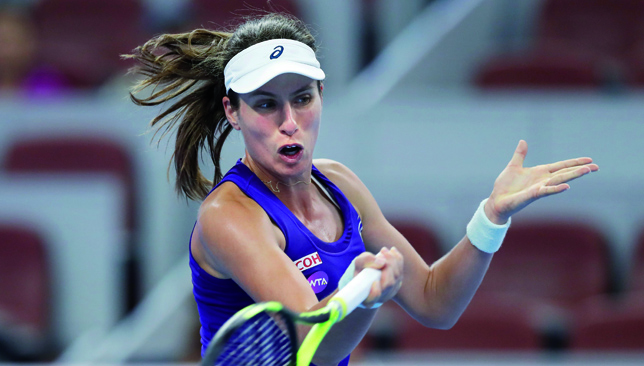
Most players repeatedly say tennis is more about mental strength than anything else, yet not nearly enough of them work with psychologists to try and hone that aspect of their game.
While working with psychologists is not new to tennis – Ivan Lendl travelled with one when he was playing in the ‘80s – the practice is not as common as one would expect, and if it is, then not many players openly talk about it.
On the women’s tour, several players who have experienced a significant rise in their ranking in the past couple of years, have cited their work with mental coaches or sports psychologists as a crucial factor in their ascension.
World No8 Dominika Cibulkova, No10 Carla Suarez Navarro, and No13 Johanna Konta, all have psychologists as vital members of their team.
Cibulkova, who was out for four months last year recovering from Achilles surgery, rose from No66 in the world to No8 in just the last eight months.
The Slovak, along with Suarez Navarro and Konta are all in contention for the WTA Finals in Singapore and are currently battling out on the courts of the Asian swing trying to clinch one of three remaining qualification tickets to the season finale. Cibulkova started working with a mental coach at the start of last year before she had surgery.
“That helped a big part of my game,” Cibulkova told Sport360 about teaming up with a mental coach. “Because I was always a good player, I had a good forehand, backhand, and we’re always working on my serve but I could get very negative during the matches and this is what helps me to keep myself into the match when I don’t feel well and I changed so many things and it really helped me.”
Spanish No2 Suarez Navarro feels her psychologist has made a huge difference when it comes to being able to perform well on the court, as well as communicating better with her coaches.
The 28-year-old struggled in the second half of the 2015 season, after rising to No8 in the world in May.
She speaks with her psychologist once or twice a week, and sometimes before specific matches.
“I started thinking about it last year when I lost a lot of matches after Wimbledon,” said the Spaniard, of what drove her to hire a psychologist.
“I didn’t think that with my coaches we could find the solution for that, because I was playing well and practicing well so it was something with my mind for sure.”
Then the Pom-poms were added and the music kicked in!! #partytime #wuhanopentennis @CarlaSuarezNava pic.twitter.com/zhbuir4yKa
— Wuhan Open (@wuhanopentennis) September 27, 2016
She said she was trying to find ways to be more positive on the court.
“And also to try to tell my coaches more the things that I’m feeling,” explained Suarez Navarro, who added that she tends to bottle up her feelings both in her professional and personal lives – something her psychologist has helped her with.
She feels hiring a sports psychologist is not very common in tennis – “maybe in a few months or in certain moments, but not regular” – and she understands why some players can be reluctant about it.
“It’s true that psychologists that never played tennis, it’s difficult to try to understand you in some situations. I was thinking to use a psychologist a long time ago but I was telling myself ‘they don’t understand some situations’. But now I think that there’s nothing to lose really from hiring one,” said Suarez Navarro.
World No2 Andy Murray initially wasn’t a fan of sports psychologists, and shared Suarez Navarro’s early feelings towards them, but the Scot changed his mind when he started working with hiscoach Ivan Lendl, who recommended Alexis Castorri, the same psychologist Lendl travelled with many years ago.
Murray went on to win an Olympic gold medal and the US Open in 2012, and Wimbledon in 2013. Nowadays, Murray prefers working with a psychiatrist to a psychologist, and says he is more interested in learning how the brain works and how it results in certain behaviours on the court.
Konta is another Brit who has benefitted greatly from working with a psychologist. The 25-year-old is on the verge of becoming Great Britain’s first top-10 player in 32 years. Just 16 months ago, she was ranked No147 in the world.
She is a player who is incredibly committed to staying level-headed no matter the circumstances. She focuses on the process rather than the result and it’s how she has rocketed up the rankings.
“I’ve worked with quite a few sports psychologists throughout the years. And I remember, even when I was 11 or 12 when I was still in Australia, through the Australian federation, there was one there. So I was not adverse or anything like that,” says Konta. “My only resistance towards it was that I kind of felt that I was hearing the same things and I wasn’t able to really grasp it and really use it.
“I think it’s a very individual thing, you need to find the person – just as with coaching on the tennis court or fitness trainers or physios, you’ve got to find the person that you learn off and absorb things from.”